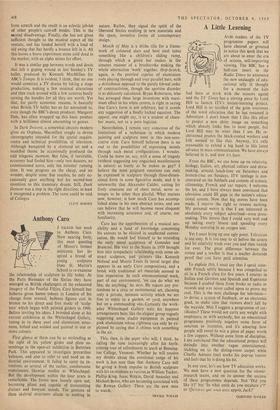A Little Learning
AVID readers of the TV programme papers will have cheered or groaned to notice this week that we are about to enter the era of serious, self-improving viewing. The BBC has a half-size insert in the Radio Times to announce the new onslaught of edu- cational telly (I thought for a moment the kids had been at work with the scissors again) and the TV Times has a stirring piece by Lord Hill to launch ITV's instant-learning project. Lord Hill is so terrified of the grim overtones of the word education , that he has renamed it Adventure. I don't know that I like this effort to project a new shiny image on something which already looks fine to most people, but Lord Hill may be wiser than I am. He re- christened prunes the black-coated workers and folk seemed to like that. Anyway, it's only reasonable to extend a big hand to this latest advance in mass communication. We have always believed in it, and now it's here.
From the BBC, we can bone up on relativity, biology, Italian, art, physical culture and dress- making, around lunch-time on Saturdays and brunch-time on Sundays. ITV tutelage is con- centrated on the Sabbath and consists of science, citizenship, French and car repairs. I welcome the lot, and I have always been convinced that television could fill gaps in the nation's educa- tional system. Now that big moves have been made, I reserve the right to resume narking. My personal worry is that I am interested in absolutely every subject advertised—even dress- making. This means that I could very well end up taking every lesson and spending every Monday morning in an oxygen tent.
Yet I must bring up one ugly point. Television is too easy. It is too easy to sit before the screen and let relativity wash over you and then vanish for ever. The great difference between the screen and a teacher is that a teacher demands proof that you have paid attention.
To explain this, I must say that I speak toler- able French solely because I was compelled to sit in a French class for five years. I smatter in Italian and German and Spanish and Esperanto because I studied these from books or radio or records and was never called upon to prove my zeal. This is the next challenge for television— to devise a system of feedback, or an electronic goad, to make sure that viewers don't fall by the wayside. May I suggest a programme of cer- tificates? These would not carry any weight with employers, or with anybody, but an educational programme positively requires some form of sanction or incentive, and it's amazing how people will sweat to win a piece of paper worth a few coppers. Without some form of discipline, I am convinced that the educational project will dwindle into another vague entertainment, trickling on to the dining-room carpet while Charlie Admass (me) works his pop-up toaster and feels that he is doing his bit.
In any case, let's see how TV education works. We now have a new question for the viewer- , research teams, and on its answer the success of these programmes depends. Not 'Did you like it?' but `In what units do you meaSure or 'Qu'est-ce que vous avez appris, Jack?'
CLIFFORD HANLEY










































 Previous page
Previous page